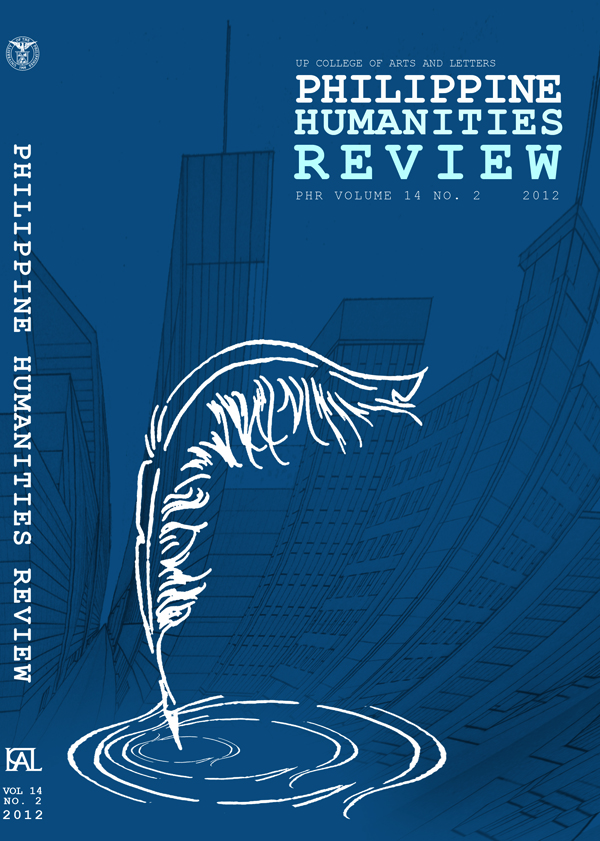Mula Wowowee hanggang Ultra: Telebisyon, Uri at Ideolohiya <br> [From Wowowee to Ultra: Television, Class and Ideology]
Abstract
This paper is a critical intervention and interrogation of thenoontime television show Wowowee which was televised from 5
February 2005 to 30 July 2010 in ABS-CBN 2. The show has then
moved to ABC 5. Although its move to another TV network and the
characteristics of its subsequent format deserve a separate paper,
it can be said that the discursive language utilized by game shows
rarewly deviate from the formulaic and profit-driven logic systemic
to the media industry. This paper offers not only a specific mode of
knowing and assessment of a particular television text (Wowowee)
but also a theoretical grid and lens that might aid future scholars
of television studies and popular culture who aim to dismantle
the ramification of apolitical theorizations in the field of academic
warfare and media criticism. I aim to problematize how televisual
imageries, mediated significations, and regimes of discourses in
television articulate a deodorized and depoliticized rendering of
specific societal contradictions experienced by the broad masses
through poverty, underdevelopment, and injustice. Coming from
this theoretical position, I aim to show how the “culture industry,”
such as the show Wowowee, legitimizes and authenticates existing
power relations and modes of domination between contending
classes in Philippine society. More specifically, how the show
fabricates concrete ideological positions and mediated imaginings
of intertwining discourses of class, poverty, and the politics of
hope in order to incorporate and subsume the toiling masses to
the hegemonic logic and character of the capitalist media industry
and society. Pushing further my point, I attempt to demonstrate
how the ideology of consumerism, commodification, and the ethos
of liberalism serve as vital ideological imperatives that seamlessly
This paper is a critical intervention and interrogation of the
noontime television show Wowowee which was televised from 5
February 2005 to 30 July 2010 in ABS-CBN 2. The show has then
moved to ABC 5. Although its move to another TV network and the
characteristics of its subsequent format deserve a separate paper,
it can be said that the discursive language utilized by game shows
rarewly deviate from the formulaic and profit-driven logic systemic
to the media industry. This paper offers not only a specific mode of
knowing and assessment of a particular television text (Wowowee)
but also a theoretical grid and lens that might aid future scholars
of television studies and popular culture who aim to dismantle
the ramification of apolitical theorizations in the field of academic
warfare and media criticism. I aim to problematize how televisual
imageries, mediated significations, and regimes of discourses in
television articulate a deodorized and depoliticized rendering of
specific societal contradictions experienced by the broad masses
through poverty, underdevelopment, and injustice. Coming from
this theoretical position, I aim to show how the “culture industry,”
such as the show Wowowee, legitimizes and authenticates existing
power relations and modes of domination between contending
classes in Philippine society. More specifically, how the show
fabricates concrete ideological positions and mediated imaginings
of intertwining discourses of class, poverty, and the politics of
hope in order to incorporate and subsume the toiling masses to
the hegemonic logic and character of the capitalist media industry
and society. Pushing further my point, I attempt to demonstrate
how the ideology of consumerism, commodification, and the ethos
of liberalism serve as vital ideological imperatives that seamlessly
shape and re-shape the language of television in this era of global
monopoly capital. Lastly, I aim to map out how the academic act of
critical intervention can serve as counter-hegemonic position that
will put premium to the political arena of academic criticism, much
less, to the very act of reclaiming media and cultural production in
order for it to justly serve the people. Thus, as I would assert, it is
the tacit function of criticism and cultural production to radicalize
and politicize the masses. As such, there is great importance in
returning to ideological criticism and Marxism.
Keywords: Television Studies, Popular Culture, Wowowee, Class,
Globalization
Published
2015-11-09
How to Cite
PANGILINAN, Choy.
Mula Wowowee hanggang Ultra: Telebisyon, Uri at Ideolohiya
[From Wowowee to Ultra: Television, Class and Ideology]. Philippine Humanities Review, [S.l.], v. 14, n. 2, nov. 2015. ISSN 0031-7802. Available at: <https://journals.upd.edu.ph/index.php/phr/article/view/4687>. Date accessed: 23 aug. 2025.
[From Wowowee to Ultra: Television, Class and Ideology]. Philippine Humanities Review, [S.l.], v. 14, n. 2, nov. 2015. ISSN 0031-7802. Available at: <https://journals.upd.edu.ph/index.php/phr/article/view/4687>. Date accessed: 23 aug. 2025.
Issue
Section
Articles


